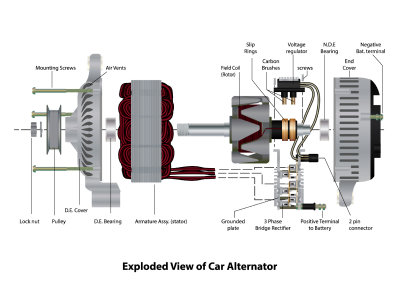What is an alternator, why is it important and what does it do?

An alternator is a crucial component in a car's electrical system, acting like a mini power plant. Here's what it does:
- Generates electricity: Unlike a battery that stores electricity, the alternator actively produces it. It converts the mechanical energy from the engine's rotation (via a belt) into electrical energy.
- Powers the car's electrical components: Once generated, this electricity powers all the car's electrical systems, including the headlights, taillights, dashboard instruments, radio, air conditioning, and other electronic features.
- Charges the battery: While the alternator supplies power to the car's electrical components when the engine is running, it also plays a vital role in charging the car battery. This ensures the battery has enough power to start the car and provide backup power when needed.
- Maintains consistent voltage: The alternator doesn't just generate electricity; it also regulates its voltage output. This is crucial because electronic components require a consistent voltage to function properly. A voltage regulator, working in conjunction with the alternator, ensures the voltage stays within the appropriate range.
In simpler terms, the alternator is like a tireless worker: it keeps the car's electrical systems running smoothly while simultaneously charging the battery, ensuring a reliable and functional electrical system.